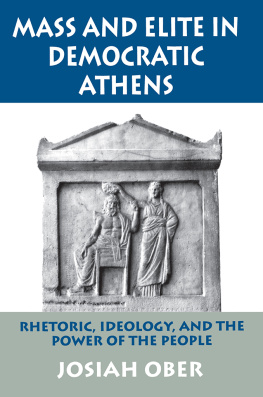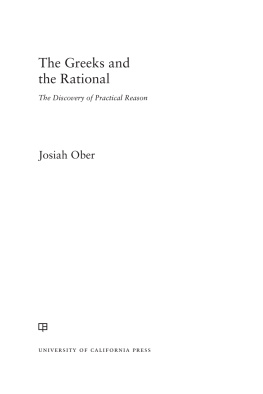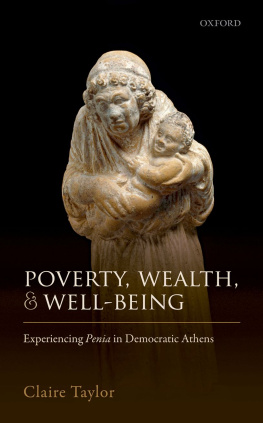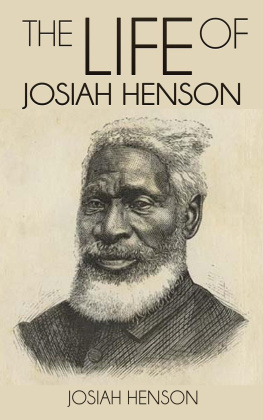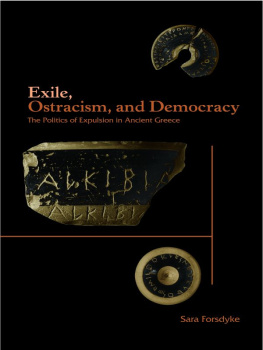Josiah Ober - Mass and Elite in Democratic Athens
Here you can read online Josiah Ober - Mass and Elite in Democratic Athens full text of the book (entire story) in english for free. Download pdf and epub, get meaning, cover and reviews about this ebook. year: 2021, publisher: Princeton UP, genre: Politics. Description of the work, (preface) as well as reviews are available. Best literature library LitArk.com created for fans of good reading and offers a wide selection of genres:
Romance novel
Science fiction
Adventure
Detective
Science
History
Home and family
Prose
Art
Politics
Computer
Non-fiction
Religion
Business
Children
Humor
Choose a favorite category and find really read worthwhile books. Enjoy immersion in the world of imagination, feel the emotions of the characters or learn something new for yourself, make an fascinating discovery.
- Book:Mass and Elite in Democratic Athens
- Author:
- Publisher:Princeton UP
- Genre:
- Year:2021
- Rating:3 / 5
- Favourites:Add to favourites
- Your mark:
- 60
- 1
- 2
- 3
- 4
- 5
Mass and Elite in Democratic Athens: summary, description and annotation
We offer to read an annotation, description, summary or preface (depends on what the author of the book "Mass and Elite in Democratic Athens" wrote himself). If you haven't found the necessary information about the book — write in the comments, we will try to find it.
Mass and Elite in Democratic Athens — read online for free the complete book (whole text) full work
Below is the text of the book, divided by pages. System saving the place of the last page read, allows you to conveniently read the book "Mass and Elite in Democratic Athens" online for free, without having to search again every time where you left off. Put a bookmark, and you can go to the page where you finished reading at any time.
Font size:
Interval:
Bookmark:

MASS AND ELITE IN DEMOCRATIC ATHENS
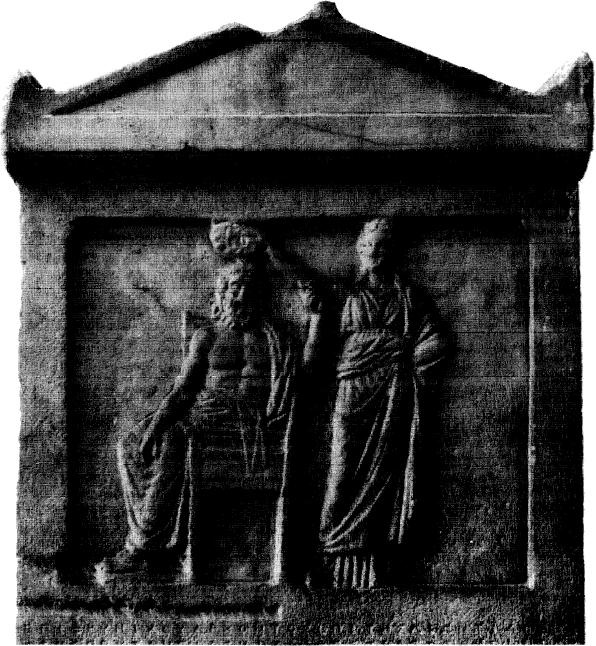
Demokratia crowning Demos. Athenian public document relief adorning the Law against Tyranny (337/6 B.C.). (Courtesy of the American School of Classical Studies at Athens: Agora Excavations.)
MASS AND ELITE IN DEMOCRATIC ATHENS
Rhetoric, Ideology, and the
Power of the People
BY
JOSIAH OBER
PRINCETON
UNIVERSITY PRESS
Copyright 1989 by Princeton University Press
Published by Princeton University Press, 41 William Street,
Princeton, New Jersey 08540
In the United Kingdom: Princeton University Press, Chichester, West Sussex
All Rights Reserved
Library of Congress Cataloging-in-Publication Data
Ober, Josiah.
Mass and elite in democratic Athens : rhetoric, ideology, and the
power of the people / Josiah Ober.
p. cm. Bibliography: p. Includes index.
ISBN 0-691-09443-8 (alk. paper)
ISBN 0-691-02864-8 (pbk.)
1. Athens (Greece)Politics and government. 2. Political participationGreece
Athens. 3. Political leadershipGreeceAthens. I. Title.
JC79.A8024 1989 306'.2'0938dc19 88-25413
Second printing, with corrections, 1990
9 8 7 6 5
eISBN: 978-1-400-82051-1
R0
For my father, Nathaniel Ober,
whose praxis helped me to
formulate a hypothesis.
PREFACE
Thanks to the influence of the dedicand, I had begun to think about the role of elite and egalitarian institutions in democratic society long before I first read the Attic orators. Yet I had been studying the orators for quite a while before the elitist tone of Demosthenes comments on Aeschines in On the Crown struck my attention. That was ten years ago. Given this extended period of gestation, it is perhaps inevitable that my purposes and intentions in writing about mass and elite in Athens should be manifold. First, the book is meant to be a contribution to Greek history: an attempt to explain the social roots and internal functioning of the political system of an ancient city-state. I hope that many of those who consider the history and culture of fifth- and fourth-century Athens intrinsically interesting, as I do, will find this study valuable in formulating or reformulating their own assessments of classical Greece.
My other primary goals in writing the book may be less self-evident. Some historians of Greco-Roman antiquity, including myself, have embraced the technique of employing models devised by modern social scientists to help explain ancient society. When models are used crudely or mechanically, however, the results are unlikely to be persuasive. I propose that it is now time for students of the classics to take a dynamic approach to methodology and theory. A field that engages a relatively large number of scholars in studying a relatively small body of texts, and in which cross-disciplinary work is inevitable, presents an ideal environment for the production, refinement, and testing of critical theories and social models. And these models and theories may have relevance well beyond the study of the Greco-Roman world and its cultural products. The book is therefore intended as an example of a radical approach to classical history. I have combined a central tenet of Annales-School social historythe importance of understanding the mentality of ordinary peoplewith a major insight of modern literary theory: viewing texts as symbol-systems that must be understood in relationship to their receptors. The result is a reading of the political development of an ancient state that is more concerned with rhetoric and popular ideology than with constitutions, personalities, factions, or foreign relations. I hope to show that Athenian decision-making processes were coherent without being completely rational, that effective leadership coexisted with genuine popular sovereignty, and that ideological hegemony, while vitally important, was not a tool of the leisure class. In the end, I hope to demonstrate how a democratic political culture came into being and how it sustained and reproduced itself through the generation of rules (laws and political institutions) and discourse (especially public rhetoric). This demonstration should have some significance for students of political theory.
Deciding what conditions will foster stable democratic government and will reproduce democratic political culture is a matter of practical importance to all citizens of democratic states, as well as a matter for debate among theorists. But there are few historical examples of the independent evolution of a democratic political culture. Theory testing using modern democracies is problematic, since most are quite young, and their ultimate form remains unknown. Testing is further complicated by the tendency of modern political leaders to devise policy on the basis of theoretical constructsanalysis of the validity of Keynesian economics (for example) is arguably complicated by policymakers attempts to implement it. Since the ancient Athenians were not influenced by modern political, social, and economic theory, their actions and discourse provide an empirical testing ground for models of democratic political behavior. Thus, as I wrote this book, I had in mind an audience that includes classicists, historians, and social and political scientists, as well as citizens concerned with the potential of democracy as a means of self-government and as a way of life.
Attempting to reach a broad audience requires some divergences from the traditional rhetoric of classical scholarship. I have cited in the notes various studies intended to aid the non-classicist (these appear with asterisks in the Select Bibliography) as well as more technical and specialized studies. In order to make the book accessible to those who do not read classical Greek, I have translated all Greek passages and have defined Greek terms at first use. Greek terms that are used frequently are listed in the index; the page on which the definition appears is indicated in boldface. In order to make the books appearance less forbidding, I have transliterated Greek phrases. My translations of the Attic orators are often based on the generally quite readable Loeb Classical Library editions.
In the process of researching and writing this book I have contracted many debts, material and intellectual. Drafts of unpublished papers and articles were made available to me by Glenn Bugh, William Dray, Mogens Hansen, Carol Lawton, Carnes Lord, Paul Rahe, David Small, Barry Strauss, Robert Wallace, and Jack Winkler; much of this material has since appeared in print, but early access to their conclusions saved me much time and trouble. The generous leave policy of Montana State University, along with financial support from the Office of the Vice-President for Research and the Department of History and Philosophy, made the project possible. Much of the primary research, hypothesis formulation, and writing were undertaken in 19831984, while I was a Fellow of the National Humanities Center. Discussions there with scholars in a variety of disciplines were seminal in the development of many of the ideas presented here. Among my fellow Fellows, Michael Alexander, William Dray, Linda Kauffman, Robert Lane, Gladys and Kurt Lang, and Helen North were particularly helpful. The penultimate draft of the manuscript was completed in 19861987, while I was a visiting professor at the University of Michigan. In Ann Arbor I benefited from conversations with Sally Humphreys, Riet Van Bremen, and Chester Starr, among others.
Font size:
Interval:
Bookmark:
Similar books «Mass and Elite in Democratic Athens»
Look at similar books to Mass and Elite in Democratic Athens. We have selected literature similar in name and meaning in the hope of providing readers with more options to find new, interesting, not yet read works.
Discussion, reviews of the book Mass and Elite in Democratic Athens and just readers' own opinions. Leave your comments, write what you think about the work, its meaning or the main characters. Specify what exactly you liked and what you didn't like, and why you think so.

